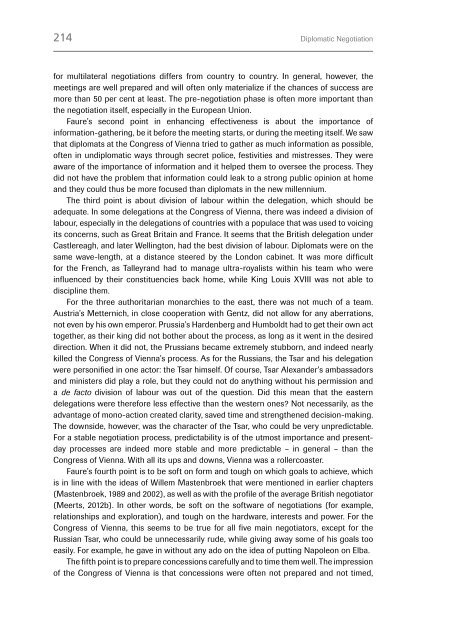Diplomatic Negotiation
Diplomatic_Negotiation_Web_2015
Diplomatic_Negotiation_Web_2015
You also want an ePaper? Increase the reach of your titles
YUMPU automatically turns print PDFs into web optimized ePapers that Google loves.
214 <strong>Diplomatic</strong> <strong>Negotiation</strong><br />
for multilateral negotiations differs from country to country. In general, however, the<br />
meetings are well prepared and will often only materialize if the chances of success are<br />
more than 50 per cent at least. The pre-negotiation phase is often more important than<br />
the negotiation itself, especially in the European Union.<br />
Faure’s second point in enhancing effectiveness is about the importance of<br />
information-gathering, be it before the meeting starts, or during the meeting itself. We saw<br />
that diplomats at the Congress of Vienna tried to gather as much information as possible,<br />
often in undiplomatic ways through secret police, festivities and mistresses. They were<br />
aware of the importance of information and it helped them to oversee the process. They<br />
did not have the problem that information could leak to a strong public opinion at home<br />
and they could thus be more focused than diplomats in the new millennium.<br />
The third point is about division of labour within the delegation, which should be<br />
adequate. In some delegations at the Congress of Vienna, there was indeed a division of<br />
labour, especially in the delegations of countries with a populace that was used to voicing<br />
its concerns, such as Great Britain and France. It seems that the British delegation under<br />
Castlereagh, and later Wellington, had the best division of labour. Diplomats were on the<br />
same wave-length, at a distance steered by the London cabinet. It was more difficult<br />
for the French, as Talleyrand had to manage ultra-royalists within his team who were<br />
influenced by their constituencies back home, while King Louis XVIII was not able to<br />
discipline them.<br />
For the three authoritarian monarchies to the east, there was not much of a team.<br />
Austria’s Metternich, in close cooperation with Gentz, did not allow for any aberrations,<br />
not even by his own emperor. Prussia’s Hardenberg and Humboldt had to get their own act<br />
together, as their king did not bother about the process, as long as it went in the desired<br />
direction. When it did not, the Prussians became extremely stubborn, and indeed nearly<br />
killed the Congress of Vienna’s process. As for the Russians, the Tsar and his delegation<br />
were personified in one actor: the Tsar himself. Of course, Tsar Alexander’s ambassadors<br />
and ministers did play a role, but they could not do anything without his permission and<br />
a de facto division of labour was out of the question. Did this mean that the eastern<br />
delegations were therefore less effective than the western ones? Not necessarily, as the<br />
advantage of mono-action created clarity, saved time and strengthened decision-making.<br />
The downside, however, was the character of the Tsar, who could be very unpredictable.<br />
For a stable negotiation process, predictability is of the utmost importance and presentday<br />
processes are indeed more stable and more predictable – in general – than the<br />
Congress of Vienna. With all its ups and downs, Vienna was a rollercoaster.<br />
Faure’s fourth point is to be soft on form and tough on which goals to achieve, which<br />
is in line with the ideas of Willem Mastenbroek that were mentioned in earlier chapters<br />
(Mastenbroek, 1989 and 2002), as well as with the profile of the average British negotiator<br />
(Meerts, 2012b). In other words, be soft on the software of negotiations (for example,<br />
relationships and exploration), and tough on the hardware, interests and power. For the<br />
Congress of Vienna, this seems to be true for all five main negotiators, except for the<br />
Russian Tsar, who could be unnecessarily rude, while giving away some of his goals too<br />
easily. For example, he gave in without any ado on the idea of putting Napoleon on Elba.<br />
The fifth point is to prepare concessions carefully and to time them well. The impression<br />
of the Congress of Vienna is that concessions were often not prepared and not timed,


